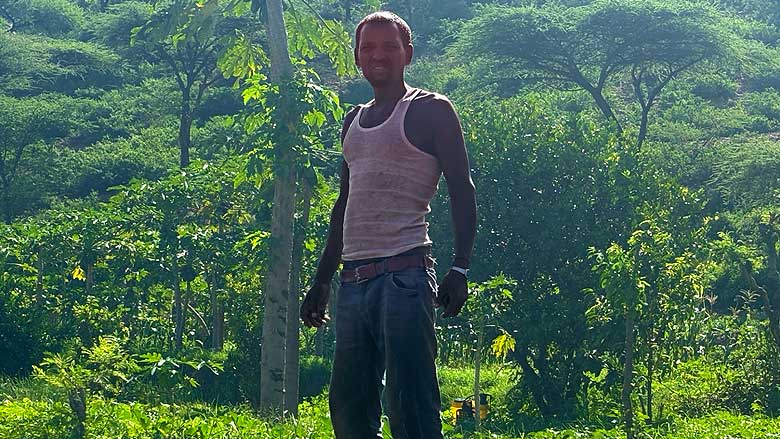In the arid outskirts of Dire Dawa – a City Administration in the eastern Ethiopia – where the sun beats down relentlessly on the parched earth, a remarkable tale of resilience and triumph has taken root. This is the story of Mohamed Aduse and his band of determined young friends, who have risen from the depths of backbreaking labor to become pioneers of agricultural prosperity, thanks to the support they received through the World Bank’s Ethiopia Agricultural Growth Project II (AGP II). The project’s objective is to increase agricultural productivity and commercialization of smallholder farmers in targeted locations.
Not so long ago, the sound of hammers striking rock echoed through the quarries, where Mohamed and his comrades spent their days chiseling and dressing cobblestones for the local road authority. The dust settled heavily on their sweat-drenched brows, and their callused hands bore the marks of their toil. Each day's labor yielded a paltry 200 birr (about $3.50)– a meager sum that barely kept hunger at bay.
In 2018, Mohamed and his friends took a leap of faith, forming the Burka Aneni small holder irrigation farm group. With little more than determination and a shared dream, they embarked on a journey that would test their resolve at every turn.
Wielding shovels instead of hammers, they dug deep into the unyielding earth, carving out a hand-dug well that would become the wellspring of their newfound livelihood. With the help of a diesel pump they bought through the project’s support, they started irrigating their onion, tomato, and pepper seeds. Skeptics scoffed, doubting their ability to transform this barren landscape into a verdant oasis. But the group's unwavering belief propelled them forward, defying the naysayers with each shovelful of soil they displaced.
Support from the project has been offering a lifeline to those brave enough to grasp it. Specifically, the project provided inputs like seeds, fertilizer and pesticides in amount of $2,000. Also, trainings were given on seedbed preparation, row planting, irrigation water management, postharvest handling, and more. With financial assistance and technical expertise, the group constructed a protective wall around their well and facilitated the connection to the electric grid – a modern marvel that would power their dreams. Cost of fuel for the diesel pump for a single day was nearly equivalent to an entire month's electricity bill, so with assistance in amount of about $8,000 from the project, they switched to grid electricity, significantly lowering their operational expenses.
As the first seeds took root, a transformation began to unfold. The once-desolate landscape erupted with life, as vibrant papaya trees, fragrant citrus groves, and lush vegetable patches painted a new canvas of abundance. Mohamed and his friends became masters of their domain, tending to their crops with a reverence born of hard-won knowledge and perseverance.




